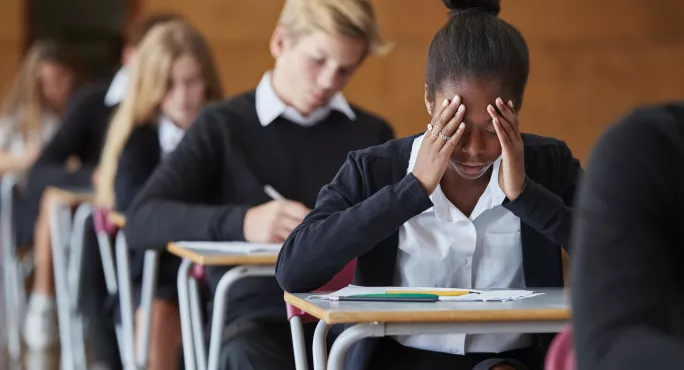
- Home
- Mental health: homework ‘linked to unhappiness’
Mental health: homework ‘linked to unhappiness’

Teenage girls who do six or more hours of homework a week are less happy than those who do not spend as much time studying, according to a major new report on children and young people’s wellbeing.
The Department for Education has published its first State of the Nation report on children and young people’s wellbeing today, World Mental Health Day.
The research shows that while for girls aged 14-15 having a positive attitude to school is associated with better psychological health, girls who did more homework reported poorer psychological health.
Need to know: Four ways teachers can help pupils to overcome perfectionism
Training: Teacher mental health training goes national
Quick read: More pupils seeking help with exam stress
The report says that it “may be the characteristics of girls who do higher amounts of homework that are associated with psychological health (for example, by potentially feeling more pressure to succeed) rather than there being a direct relationship between homework time and psychological health”.
The research comes after the Association of State Girls’ Schools discussed helping young women overcome unhealthy levels of perfectionism - and helping girls to take more risks.
World Mental Health Day: Student wellbeing
Teenage girls have poorer psychological health than boys of the same age, the study suggests, but wellbeing worsens for both boys and girls as they get older.
Overall, more than four in five (84.9 per cent) of 10- to 15-year-olds said they were happy with their lives. But 5 per cent said they were relatively unhappy.
“Wellbeing declines as children and young people get older,” the report states. “This highlights the need to equip children and young cope with the skills to support their wellbeing as they move into the world.”
The report shows that friendships and getting enough sleep were key factors in a young person’s happiness.
And bullying, including online bullying, was the biggest risk to children’s wellbeing.
Social media use, once other factors such as cyberbullying and lack of sleep were accounted for, did not have a strong association with teenage girls’ psychological health.
Education secretary Gavin Williamson said: “The pressures young people face today both in and out of school are vastly different to those their parents and grandparents experienced, so we need to listen to what they have to say and act on it.”
The report has used multiple data sources to report new statistics. It collates the responses of more than 7,000 young people aged 10 to 24.
The research also shows:
- 94 per cent of children felt happy with their family.
- 82.9 per cent reported high or very high life satisfaction.
- Young women were more likely to report that they had recently been anxious than young men.
- Young women were more likely to experience cyberbullying than young men.
- One in five young people aged 16 to 24 said they had experienced high levels of anxiety even while also rating their happiness and wellbeing as high.
Recent NHS data shows that emotional disorders, which include anxiety and depression, affect almost a quarter of older teenage girls (22.4 per cent of 17- to 19-year olds) and 7.9 per cent of boys the same age.
Mr Williamson added: “It’s encouraging that the overwhelming majority of children say they are happy, but we have a responsibility to do better for those that aren’t.”
Professor Peter Fonagy, CEO of the Anna Freud Centre, which has been delivering mental health awareness training in schools, said: “I very much welcome this survey and we need to absorb all its findings. It’s heartening that four out of five children are happy. However, we cannot ignore the fact that one in five children are not.
“We should be pleased that so many young people are resilient to the pressures of 21st-century life, and be both prepared to stand by and support those who struggle.”
Mr Williamson is due to visit Chosen Hill School, in Gloucestershire, today. The school is one of the 1,600 schools that have volunteered to begin delivering the government’s new Relationships, Sex and Health Education (RSHE) before it becomes compulsory in all secondary schools from September 2020. Relationships education and health education will also become compulsory from primary school age.
Chosen Hill School is also one of the schools trialling the new mental health support teams. Each of these teams will support around 20 schools and colleges in their area with the aim of speeding up access to specialist services.
The government pledged last year to publish an annual report to better understand the issues in young people’s mental health, alongside guidance for schools - which is due shortly - to help them measure their students’ wellbeing and make sure appropriate support is in place.
Register with Tes and you can read five free articles every month, plus you'll have access to our range of award-winning newsletters.
Keep reading for just £4.90 per month
You've reached your limit of free articles this month. Subscribe for £4.90 per month for three months and get:
- Unlimited access to all Tes magazine content
- Exclusive subscriber-only stories
- Award-winning email newsletters
You've reached your limit of free articles this month. Subscribe for £4.90 per month for three months and get:
- Unlimited access to all Tes magazine content
- Exclusive subscriber-only stories
- Award-winning email newsletters



